I have an eating disorder – where to from here?
The treatment of eating disorders is nuanced and complex, completely dependent on the individual and the style of treatment they respond to.
This article takes a deep dive into nutritional counselling for eating disorder treatment – what to expect and how working with a dietitian can help in your recovery journey.
What Is Nutrition Counselling?
What Happens During Nutritional Counselling?
What Nutrition Concerns Can a Dietitian Help With?
How Can A Dietitian Help With Refeeding Syndrome?
How Do I Get Started Working With A Dietitian?
Nutritional Counselling In Eating Disorder Treatment – What To Expect
How Do I Know What To Eat?
What Will I Learn About During Nutritional Counselling?
Who Will Be Involved In My Care?
I Want Nutritional Counselling – How Do I Start?
What Is Nutritional Counselling?
Nutritional counselling is a leading treatment method for all eating disorders and is led by a nutrition professional. These might include Registered Dietitians or in Australia, Accredited Practising Dietitians (APD).
The dietitian works closely with the patient to improve nutritional status and health care goals (1).
Dietitians lead this process, as they have the expertise and clinical knowledge to understand the impact that food and nutrients have on the body.
Areas that are covered in nutritional counselling include:
- Building nutritional education and knowledge
- Understanding how to build balanced meals and snacks
- Developing skills in identifying hunger and satiety cues
- Identifying and challenging food fears
- Developing knowledge around metabolism and body physiology
- Support during weight restoration if required(2).
Other areas that are covered in nutritional counselling include addressing diet culture and the influence it has on body image, nutrition, and overall mental health.
In most cases, this requires the dietitian to work as part of a multidisciplinary team.
When counselling someone struggling with their relationship with food and body, the dietitian aims to work collaboratively with the client to ensure the approach address the whole person. This considers their goals, as well as any specific cognitions and behaviours that are sustaining their eating disorder.
What Happens During Nutritional Counselling?
Nutrition counselling includes medical management/interventions, psychological/talking therapy, education sessions. Interpretations of medical reports and family therapy may also be applicable (3).
It may also include management of emotions regarding food, weight and body image. Other topics covered may include the specific anxieties related to specific foods and compensatory behaviours, and binge eating.
It is often completed alongside cognitive behavioural therapy (CBT) and dialectical behaviour therapy (DBT) (4) which are completed by a psychologist, who works with your dietitian.
By providing the individual with the correct tools, education and insight surrounding nutrition and physical/physiological health implications, their recovery is strengthened.
Dietitians are skilled in providing this, and are able to provide this at any level of care. This may include inpatient care, disorder treatment programs and outpatient services.
What Nutrition Concerns Can A Dietitian Help With?
Eating disorders cause a multitude of nutrition concerns, with implications significant impact on physical health.
This can include:
- Deficiencies – iron, zinc, phosphate, sodium
- Cardiovascular problems, – fast heart rate (tachycardia) slowed heart rate (bradycardia)
- Gastrointestinal discomfort – slowed digestion
- Slowed cognitive function – often due to nutrient deficiencies
- Endocrinological concerns – hormone levels, and blood glucose regulation
- Dehydration/malnutrition – often results in electrolyte imbalances (5).
- Refeeding syndrome
These complications all pose serious danger to patients, and can even be fatal.
Careful medical monitoring must be undertaken. This includes interpreting and taking action around what treatment can be provided from a nutrition perspective.
This is where nutritional counselling is needed to take immediate action, and ensure the patient is supported in making changes.
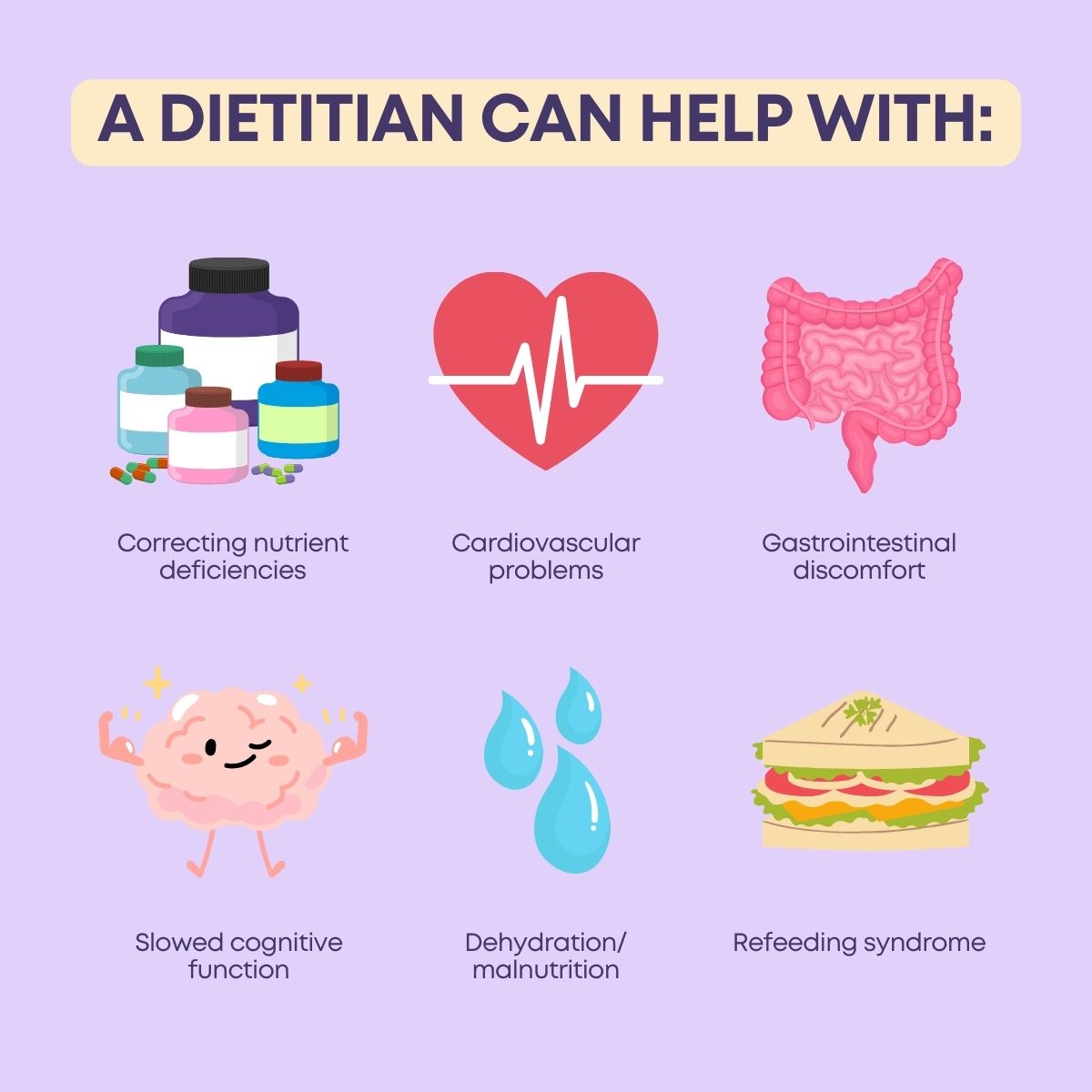
How Can Nutrition Therapy Help Me?
Nutritional therapy places the individual at the centre of treatment.
Some programs and methods of treatment use an outdated, generalised approach, treating all patients the same, despite their diagnosis and specific behaviours/cognitions.
Treatment often only centres around the restrictive aspect of eating disorders, disregarding the common experiences associated with bulimia nervosa and binge eating behaviours.
The ‘one size fits all’ treatment model has proven ineffective, highlighting the need for more complex and individualised support – offered by the treating dietitian.
As an evidence based treatment option (6) nutritional counselling and therapy has been proven to be effective.
Action can be taken following an assessment with a dietitian and evaluation of clinical indicators.
How Can A Dietitian Help With Refeeding Syndrome?
There is a consistent need for support during the refeeding process.
If the person is coming from a place of restriction and/or compensatory behaviours, the reintroduction of adequate nutrition can result in some physical symptoms, even refeeding syndrome (7).
Refeeding syndrome can be fatal, causing electrolyte and fluid shifts in the body.
To prevent this, dietitians are skilled in increasing intake at a safe rate, to lower the risk of refeeding syndrome.
Through nutritional counselling, the dietitian will explain and articulate the reasoning for specific changes, and also provide information about what physical symptoms to expect when increasing intake.
Fluid retention, stomach discomfort/constipation, and night sweats are all commonly experienced in early refeeding. Education surrounding this is pivotal in helping the individual understand the physiological processes occurring.
In an inpatient setting, this counselling is usually implemented in the daily schedule.
A dietitian leads a group session, and provides the group with education to challenge some common misconceptions around food.
This gives the individuals in the program some extra support and tools to counter the disordered thoughts.
How Do I Get Started Working With A Dietitian?
The first step to receive nutritional counselling in eating disorder treatment, is visiting your managing general practitioner.
Here, they can complete the necessary tests to assess your nutritional status and psychological state, and can provide recommendations for the level of care required.
They will complete a Medicare Eating Disorders Care Plan (EDCP) which will allow access to ED specific treatment professionals.
Australia and New Zealand Academy for Eating disorders is the primary body for eating disorder clinicians involved in ED treatment, prevention, advocacy and research in Australia (8).
They partnered with the National Eating Disorders Collaboration to establish a credentialing system for ED treatment professionals in Australia (9). Finding an accredited ANZAED NEDC treatment professional will ensure you receive the most evidence-based and educated treatment, with clinicians who have expertise in this area.
Nutritional Counselling In Eating Disorder Treatment – What To Expect
The process begins with an initial assessment – noting the clinical symptoms, cognitions, behaviours, and specific risk factors.
A comprehensive assessment of current and past eating habits, medical history, and present challenges/concerns regarding food will be made.
The dietitian will also gather information about preferences, food allergies/intolerances, and dietary restrictions.
They will review your overall health status – including medications, supplements, and pathology results.
From here, the dietitian will then work with the patient to prioritise dietary changes, as well as setting goals, depending on the unique needs of the patient.
This can include:
- Establishing regular eating patterns (3 meals, snacks as a general guide, depending on the individual)
- Meeting nutritional requirements (iron, zinc, magnesium, protein, carbohydrates, fat)
- Variety of food groups
- Adequacy of intake
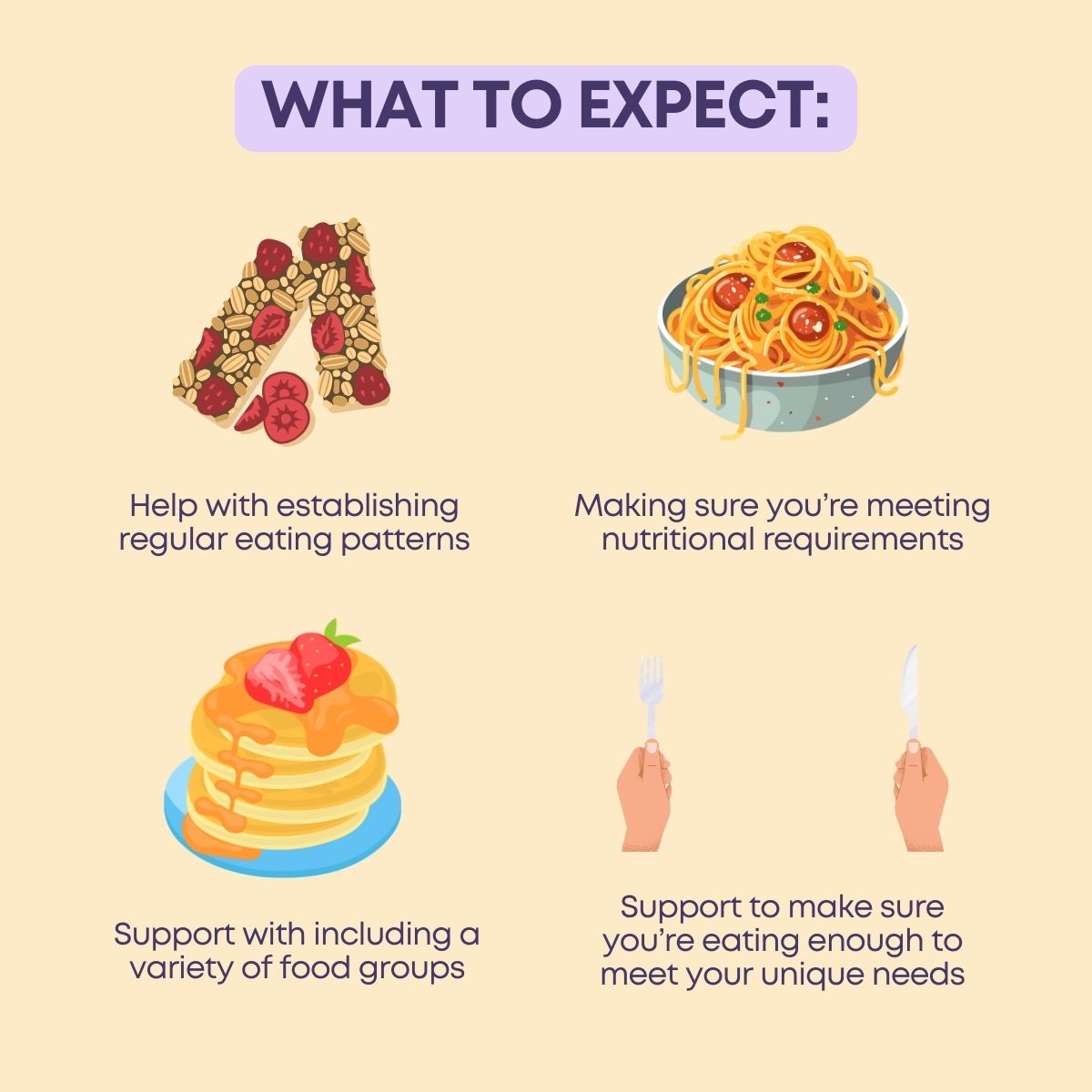
How Do I Know What To Eat?
Following this, the dietitian will take into account all factors and create a personalised meal plan, to meet your nutritional requirements.
Again, no two people will have identical plans and goals.
The meal plans are designed to be balanced, and support overall health and recovery.
Emphasis may be placed on achieving a variety of nutrients, including macronutrients (carbohydrates, protein and fats) and micronutrients (vitamins and minerals).
What Will I Learn About During Nutritional Counselling?
Your dietitian will work with you, and collaborate on any changes.
This is done with you, the individual, at the centre, educated and understanding these changes.
This may be as simple as the addition of butter to sandwiches to add energy without volume, and including juice alongside an iron-rich meal, for maximum absorption.
You will be educated about the nutritional value of various foods, and the role nutrients play in the body. The necessity for particular food groups, meals and snacks will be carefully articulated and enhance your overall understanding of food and nutrition.
Emphasis will be placed upon the importance of regular meals and snacks, learning about portion sizes, and strategies for making nutritious food choices.
Challenging Food Fears
Many people struggling with an eating disorder experience strong fears around certain foods.
For many, the beginning of an eating disorder is fuelled by diet culture.
Through working with a dietitian, the reality of these fears is constantly being worked upon.
The dietitian’s role is to educate you and gradually challenge and overcome these fear foods. Exposure to feared foods is done in a structured in a step-by-step way, to minimise discomfort.
This may include creating a list with your dietitian, and working through the foods, beginning at what causes the least distress and progressing to eventually having the foods that are most challenging.
With repetition of these foods, the levels of distress, guilt and fear are sure to decrease.
Support and socialisation is crucial in this period, as dealing with the disordered cognitions alone is often overwhelming and isolating.
Behavioural Strategies Used In Nutritional Counselling
Food is so much more than just nutrients and energy. It is connection, sharing, bonding, mindfulness, and nourishment.
Working with a dietitian to reestablish this relationship is pivotal in eating disorder recovery. Your dietitian may discuss the behavioural aspects of food, often educating surrounding mindful eating.
This is a powerful tool in establishing and building an intuitive relationship with food – learning to recognise hunger and fullness cues, and developing coping strategies for emotional eating.
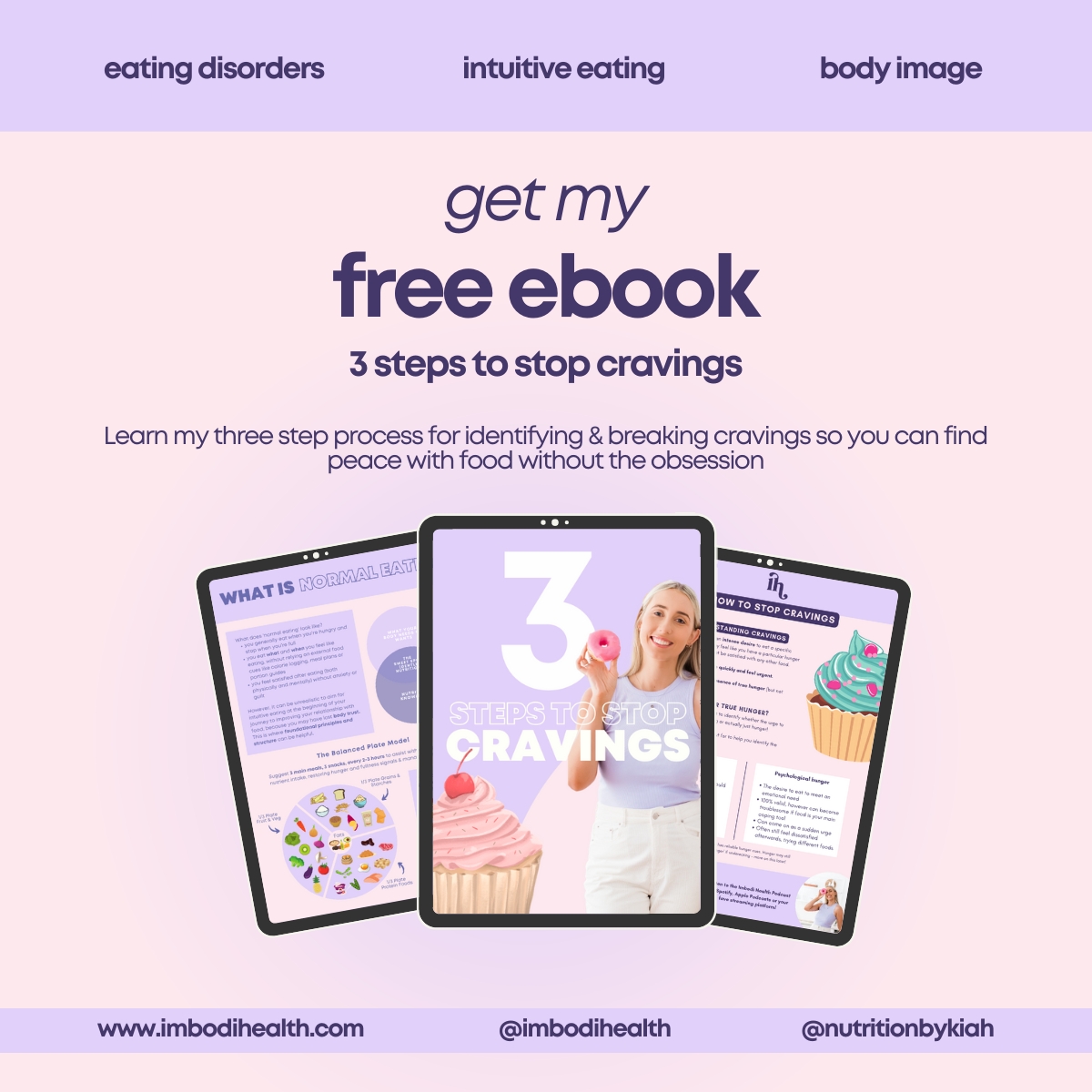
Get your copy of my free 3 Steps To Stop Cravings eBook here!
Working as part of a multidisciplinary team is important in the assessment of progress.
Having a general practitioner who monitors weight, pathology/nutritional status, medical stability and overall wellbeing is imperative in facilitating a sustainable recovery.
Your GP will work in collaboration with your dietitian, alongside therapists, psychiatrist, and medical professionals, to ensure a holistic approach to recovery. For collaborative care, it is also necessary for communication with other members of the treatment team – to address both the nutritional and psychological aspects of your eating disorder.
Access to your treatment team is granted through the Medicare EDP which facilitates the regularity of treatment and the accessibility to ED informed healthcare professionals.
At every step and progression in your nutritional counselling and therapy, you will be supported by a collaborative team.
Your dietitian will always provide a supportive and non-judgemental environment – open to feedback, offering encouragement, answer questions, and addressing any concerns that arise during the recovery process.
At Imbodi health, we offer personalised nutritional counselling in eating disorder treatment.
All of our dietitians are Accredited Practising Dietitians and have completed further training to become Credentialed Eating Disorder Clinicans (CEDC).
This means that at Imbodi, you are receiving the most thorough, educated treatment possible, from professionals who are truly passionate about what they do (12).
Eating disorders are isolating, and receiving treatment is often confronting, overwhelming and for many, feels impossible.
A multidisciplinary approach through nutritional counselling provides a level of support and care that is so, so deeply important.
This is done by placing the client at the centre of their own recovery – personally empowering, educating and becoming accountable for their own progress.
There is only so much progress that can be made out of pushing from others. Sustainable recovery needs to be driven from within, with personal motivation – nutritional counselling does this, firmly.
Accessing support is the first step to healing, and making that first appointment is scary, for many.
But, establishing a supportive network, a collaborative team, a leading dietitian who can provide nutrition counselling – that is what will lead you to a future of freedom.
You may think you are one of the people who will never recover, who will stay stuck forever.
But no one is incapable of recovery.
With the correct support, treatment and counselling, recovery is tangible and the reestablishment of a life full of colour is built. Slowly, but surely.
Reach out to Imbodi leading eating disorder treatment recovery clinicians, who can facilitate this counselling and task you with the tools, steps and support necessary to begin true healing.
Written by: Student dietitian Tara Finn
Reviewed by: Imbodi Health Dietitian Jade Wrigley
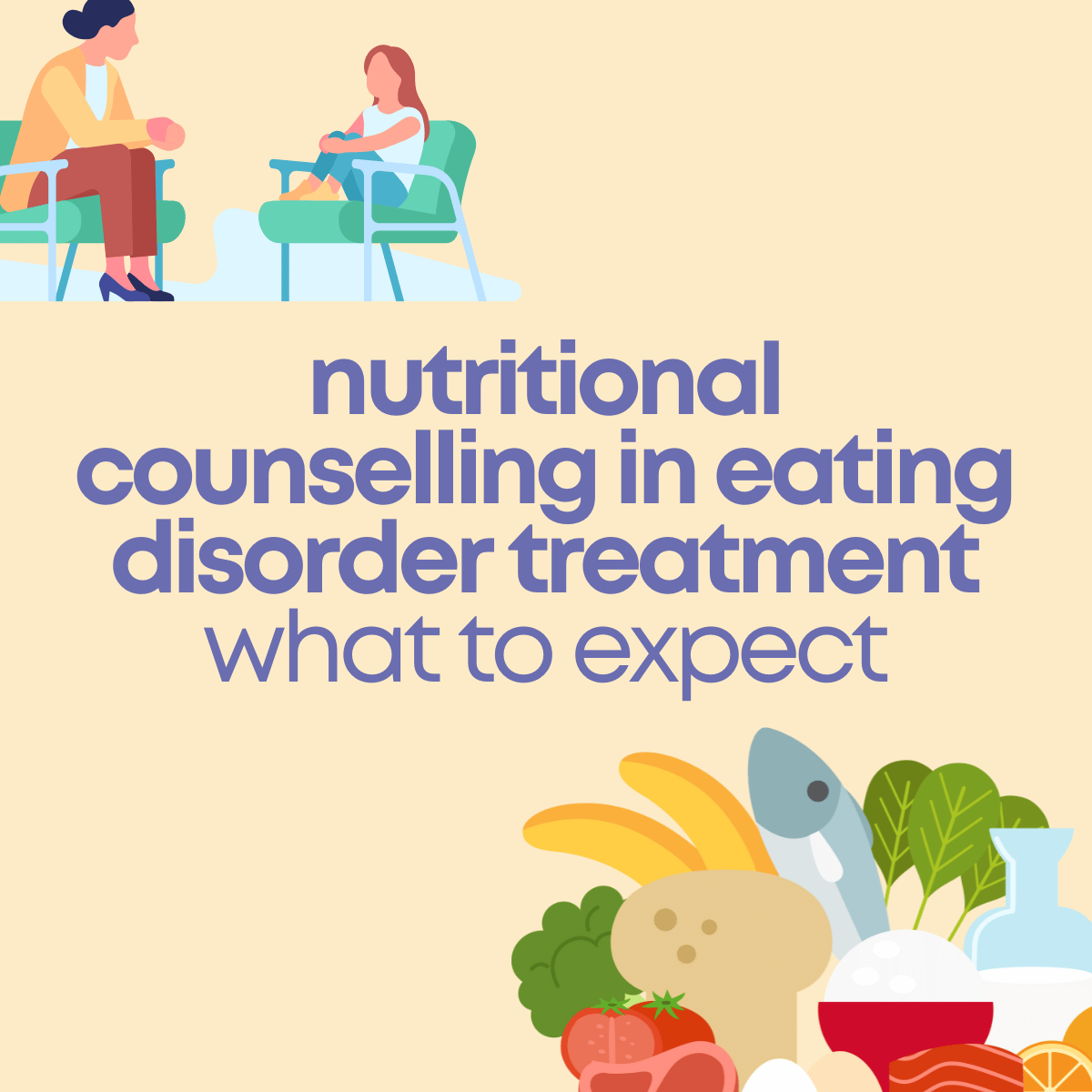
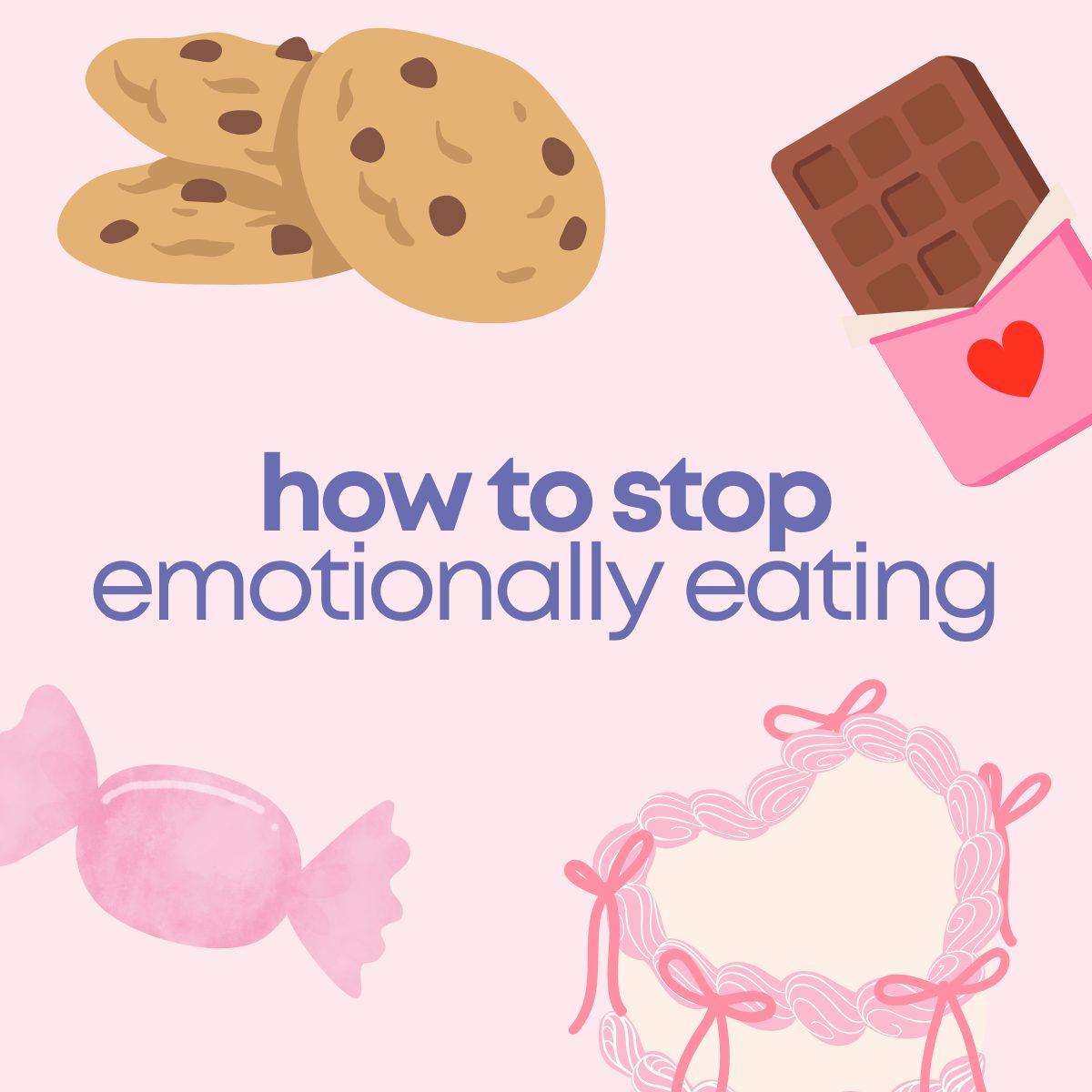
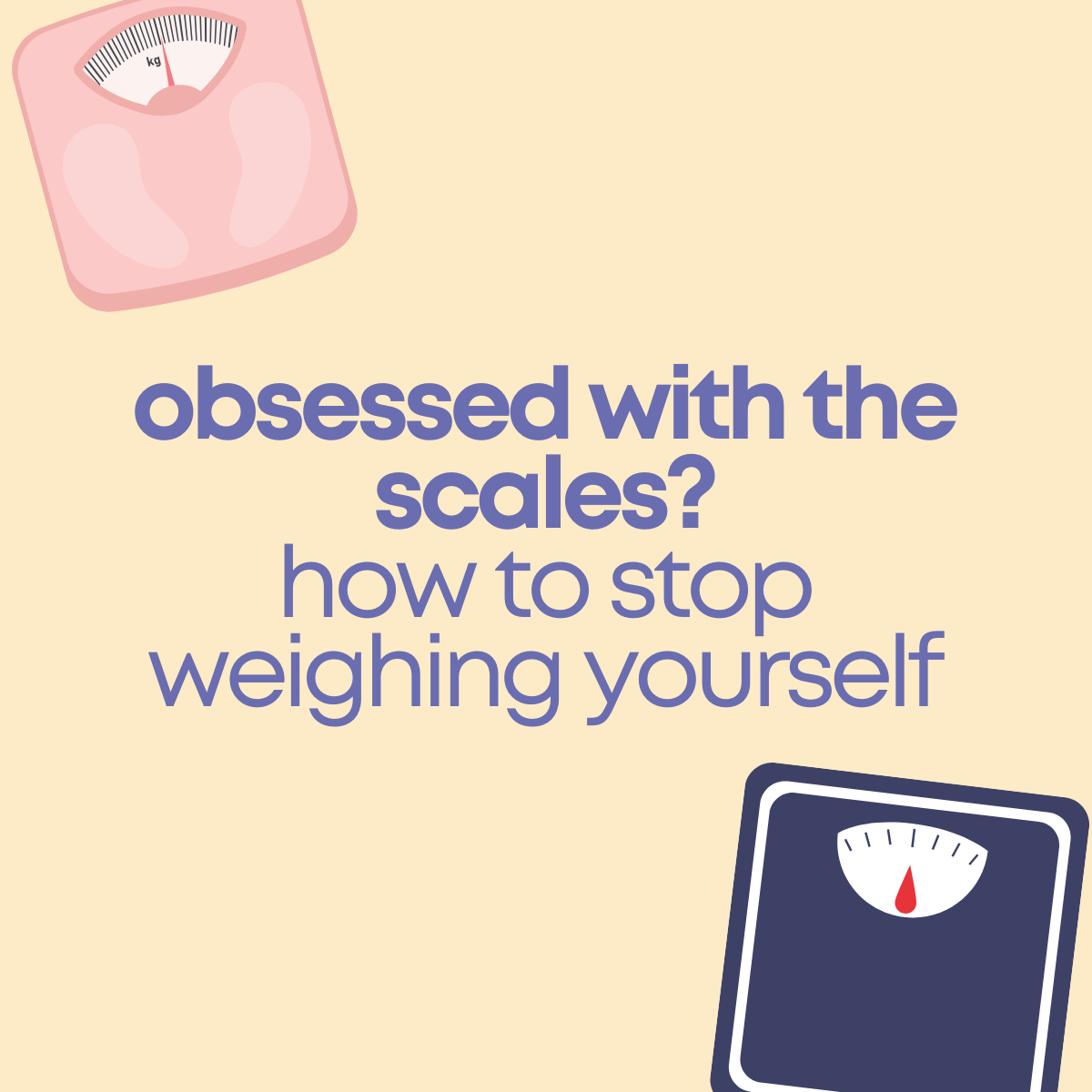
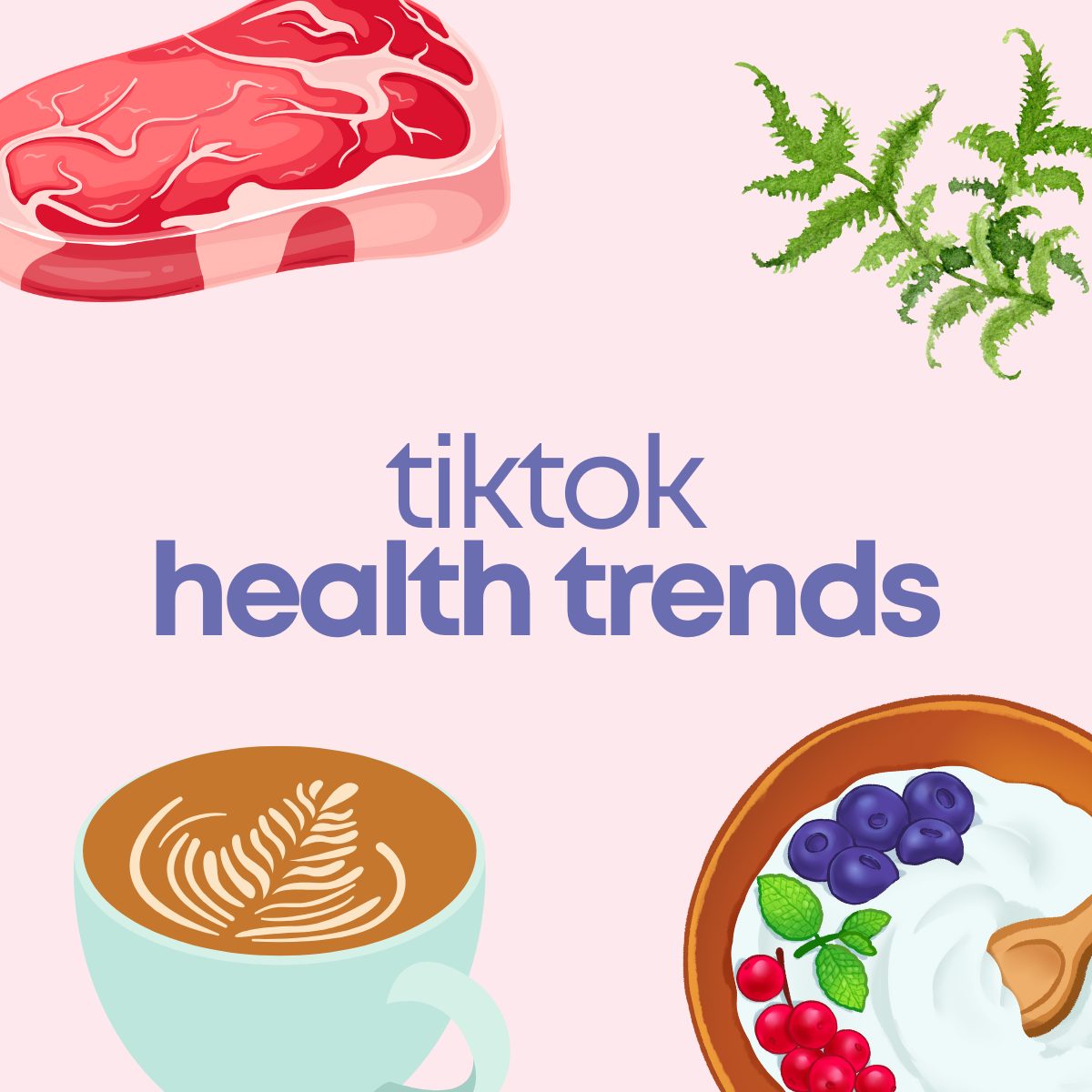
Comments +